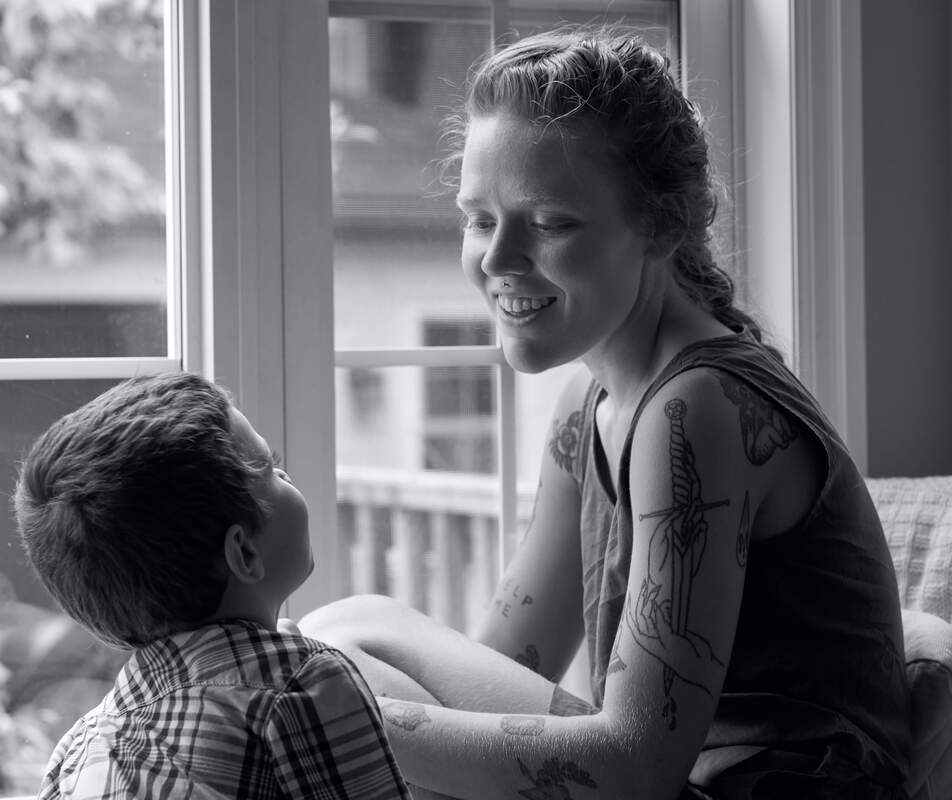
What is Parentification?
Parentification, or role reversal, is a dynamic that occurs when a child is regularly tasked with providing emotional or practical support to a parent, instead of the other way around. Parentification is a form of childhood trauma that negatively impacts development and attachment.
Parentification in Dysfunctional Family Systems
 Photo by Caroline Hernandez on Unsplash | In a healthy family system, the parent(s) is the leader of the family. They are responsible for running the household, making decisions, and meeting the physical and emotional needs of the children. In functional family systems, children experience a sense of safety and stability knowing that their caregivers are in control, have their best interests in mind, and can handle whatever difficult situations arise. |
In dysfunctional family systems where children are parentified, this sense of safety is missing. Sometimes parentification is obvious, like in situations where a child is tasked with running the household in a developmentally inappropriate way—caring for siblings, making sure the physical needs of the family are met, such as meals, bathing, cleaning, etc., but parentification is not always this obvious. Often parentification happens on an emotional/psychological level, which makes it more difficult to see. We will focus on emotional parentification in this article.
Emotional Parentification
Parentification occurs when a child comes to feel responsible for meeting the emotional and/or psychological needs of the adults around them. There’s many ways this can happen:
- Confiding in a child in a developmentally inappropriate manner
- Seeking emotional support or advice from a child
- Using a child as a mediator or involving them in family conflicts
- Expecting a child to hold family secrets so that they cannot seek support for themselves
- Expecting a child to perform tasks above their developmental level
Enmeshment and Parentification
Many of the adult clients that I see in my practice were parentified as children. Almost all of them grew up in family systems that were enmeshed.
Enmeshment is a term used to describe families that lack appropriate physical, emotional, and/or psychological boundaries. In enmeshed family systems, individuality—having your own thoughts, opinions, desires, needs, feelings, etc.—is discouraged. In enmeshed families, children are discouraged from expressing themselves if it goes against the unsaid rules of the family, if it makes the parents uncomfortable, or if it creates discomfort or conflict in any way.
In other words, keeping the “peace” is prioritized over the growth and development of the children into fully functioning, self-possessed individuals. In enmeshed family systems it feels unsafe to grow up and individuate because to do so feels like a betrayal of, or a threat to, the child’s relationship with the parents.
In enmeshed family systems love feels conditional, and differences between people are seen as a threat and are taken personally. Punishment is often covert and passive aggressive—withdrawal of approval and affection is always an underlying threat which negatively impacts the children’s sense of relational safety.
In enmeshed family systems, the parents have difficulty with emotional self-regulation, and this is where parentification comes in: the children are then forced to prioritize keeping their parent(s) regulated: I won’t do anything that might upset Dad, even if that means ignoring my own feelings.
When parents are chronically emotionally dysregulated, children do not feel safe. Kids in these families are forced to abandon their own experience (wants, needs, feelings, opinions) in favor of whatever it takes to keep the parent feeling OK.
Examples of Emotional Parentification
| A young child wants something that they can’t have, so, naturally, they feel angry. They cry, they shriek, they flail. They scream “I HATE YOU!” The parent who lacks self-awareness and self-regulation skills takes the child’s anger personally and becomes angry themselves, yelling back, or in some other way, punishing the child for expressing themselves. This punishment can be as obvious as spanking or as subtle as a contemptuous tone of voice or withdrawal of attention, approval, or affection. Both are deeply impactful. |  Photo by Russell Sutherland on Unsplash |
What do these children learn from these exchanges?
1.) Mom can’t handle my emotions/needs. They upset her. They hurt her feelings. I need to be "better" (not get so upset, not seek personal space), so I don’t upset her.
2.) If I express my true self—express my true feelings and needs, I risk losing the love and affection of my Mom.
If this dynamic of emotional dysregulation on the part of the parent is the norm, the child’s focus, naturally, becomes making sure they don’t do anything to cause the parent to become emotionally activated. They are now helping the parent regulate, instead of the other way around.
It is never the job of a child to regulate a parent’s emotions. It is the parent’s responsibility to undergo the healing and growth required to learn how to regulate themselves. Emotional maturity is the ability to self-regulate, or to take full responsibility for our own emotions.
Parents who carry unresolved trauma have a difficult time recognizing and regulating their emotional responses (which is why it is so important to do our own healing and stop the transmission of intergenerational trauma in it's tracks).
A Better Way
In scenario one, let’s imagine that the parent, feeling themselves becoming triggered by their child’s anger and/or behavior, is able to acknowledge the anxiety/anger within themselves and the urge to manipulate the child’s behavior through aggressive means (yelling and withdrawal of approval) and chooses not to.
Instead, they reflect their child’s feelings back to them, “It looks like you feel really mad. I understand how it feels to want something when you can’t have it.” Then the parent firmly and neutrally holds the boundary: “We aren’t going to play with Mommy’s books right now. Maybe we could find one of your books to read instead.”
The connection between child and parent is maintained. The child gets the message that he is safe to explore and feel as he needs to, Mom can handle it.
In scenario two, Mom recognizes her own anxiety and abandonment fears becoming activated by her teenage daughter’s need for time alone, and chooses to reach out to a friend or her therapist for support. She is able to acknowledge that her daughter’s need for space is valid, and that while her own need for support is also valid, her daughter is not the appropriate person to help her regulate her emotions. The teenager gets the message she is safe to take care of her own needs, Mom can handle it.
Mom can handle it. That is the key here, children need to know that their caregiver can handle them. Can handle their desires, their needs, wants, and feelings. Even when they themselves feel out of control.
Do parents need to be perfectly regulated at all times? No, no one is perfect. We all get emotionally dysregulated.
The important part is cultivating the self-awareness to recognize when we’ve messed up, and the skills necessary to then apologize and repair our connection with our children in those moments. All relationships are a series of ruptures and repairs. It is very important for parents to make a repair (genuinely apologize and take responsibility for their actions) when they mess up.
How Parentification in Childhood Impacts Us as Adults
Parentification forces children to put others' needs before our own. When we are parentified we learn that we need to abandon ourselves and our own needs in order to keep relationships, in order for people to love us. Chronic, pervasive low self-esteem is another common effect, because when children are parentified they are being asked to perform tasks beyond their understanding and developmental capabilities, so essentially, they are set up for failure.
Parentification in childhood can lead to the following issues in adulthood:
|  Photo by Tracey Hocking on Unsplash |
Healing From Parentification
Healing from parentification comes about through healing our relationship with ourselves and learning to give ourselves what we needed but didn’t get as children. Read more in my blogs about self-parenting and inner child healing.
Meet the Author
| Ready to heal your relationship with yourself? Maggie is a therapist based out of Lawrence, Kansas who specializes in therapy for highly sensitive adults, therapy for self-esteem, therapy for anxiety, therapy for childhood trauma, and grief and bereavement counseling. Maggie is passionate about helping people overcome shame and the fear of being their true selves. Breaking the cycles of people-pleasing and self-abandonment is possible; you don't have to suffer alone. Maggie offers online therapy throughout the state of Kansas. Reach out today to schedule your free 15 minute phone consultation! |
Other Services Offered by Maggie
In addition to providing online therapy anywhere in Kansas, Maggie is also a professional astrologer, and offers Birth Chart Readings anywhere in the United States, as well as abroad.
Astrology is a powerful tool for gaining self-awareness, finding meaning in and understanding of our difficult experiences, and for receiving validation regarding our own unique life path. All of which supports our mental health in a positive way!
Interested in getting a Natal Chart Reading? Book a free phone consultation and let’s get started!


 RSS Feed
RSS Feed
